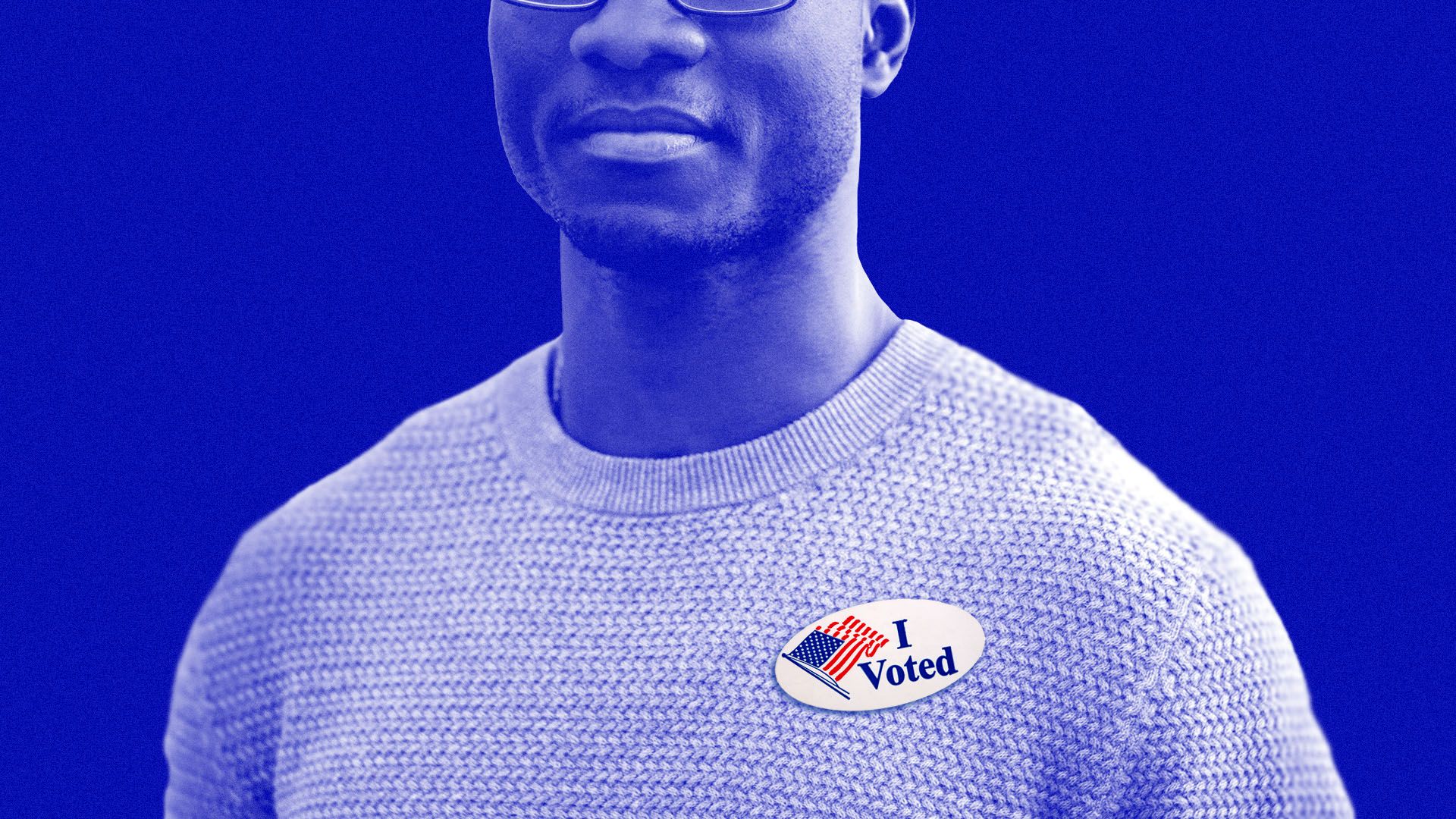2020 Democrats turn focus to black men
Add Axios as your preferred source to
see more of our stories on Google.

Illustration: Sarah Grillo/Axios
Democratic candidates have spent the last few weeks hosting intimate conversations with black men — mostly in South Carolina — tapping into how these voters think and feel about the 2020 election.
Why it matters: Black voter turnout declined in 2016 for the first time in 20 years. And 13% of black male voters supported Donald Trump — over three times the rate of black women who did the same.
An estimated 30 million black Americans will be eligible to vote next year. While black men share some of the same concerns as black women at the ballot box, they are not the exact same voting bloc.
- In the 2018 midterm elections, 55% of non-Hispanic black women voted, compared with 53% of the overall voting-age population and only 47% of non-Hispanic black men, per the U.S. Census Bureau.
- Black men may be more likely than black women to stay home or cast a vote for the GOP — but represent more untapped potential for individual candidates.
- "We have seen some movement across black voters, frankly, in not as strongly identifying with the Democratic Party as they may have previously," said Adrianne Shropshire, executive director of BlackPAC. "Where that sentiment is the strongest is among black men."
- For Democratic candidates to have these conversations with black men now is particularly important, Shropshire said, because, "There is a concerted effort to try to win over black men by the Trump campaign."
Driving the news: Sen. Cory Booker hosted a "man-to-man conversation focused on issues impacting black men" yesterday in South Carolina with over 25 people.
- After speaking for about 5 minutes, Booker took questions from the black men in the audience for more than an hour.
"The feel in the room — and it was stated several times — is that black men feel like they’ve been forgotten about within the party and when it comes to this election," said Hamilton Grant, a Democratic candidate for Richland County Council who introduced Booker at the event.
- The conversation touched on increasing economic opportunities for black men; criminal justice reform; marijuana legalization and better representation of African-American farmers in the hemp industry; gun violence prevention; free or subsidized child care; and keeping black youth safe, per Booker's campaign.
- The questions were totally different than other campaign events, one Booker campaign aide said.
The big picture: Other 2020 Democrats are ramping up their own efforts to connect with black men before voting starts early next year.
- Sen. Bernie Sanders held a rally at Morehouse the week before Thanksgiving, announcing a policy proposal that would make Historically black colleges and universities (HBCUs) tuition-free. Earlier in the fall, Sanders attended a black barbershop talk with rapper Killer Mike.
- Sen. Kamala Harris' team argues this type of outreach isn't new for her, citing early interviews on the Tom Joyner Morning Show, attending the 100 Black Men of America event last summer in Las Vegas, and speaking at black fraternity Omega Psi Phi's leadership conference in New Jersey last July.
- More recently, Harris visited a South Carolina barbershop in November for a chat with Luther "Luke" Campbell, a rapper from the group 2 Live Crew who was previously critical of her candidacy.
Pete Buttigieg, who is leading polls in the mostly white early states of Iowa and New Hampshire but lacks any significant support from black voters across the country, has been doing extensive yet under-the-radar work to introduce himself to black voters with some focus on black men in particular.
- In late November, after the Democratic debate in Atlanta, he hosted a conversation with black men at University Barbershop, a black-owned barbershop near Morehouse College — a historically black men's college.
- Buttigieg's team is working on introducing him to black voters in small, intimate settings rather than large rallies publicized for national media attention.
- At last month's debate, Buttigieg said he "welcomes the challenge of connecting with black voters in America who don't yet know me."
Former VP Joe Biden and Sen. Elizabeth Warren have mostly continued to engage black female and male voters as one bloc:
- Biden's campaign says his outreach to black men is embedded in everything they do with the African American community at large, including roundtables with black voters in Denver, Atlanta and Las Vegas, and visits to churches in Alabama and South Carolina.
- Warren held listening sessions with black male and female activists and community leaders across the country — in Philadelphia, Iowa, Nevada, New Hampshire, and South Carolina.
The other side: President Trump launched a "Black Voices for Trump" coalition in Atlanta early last month, telling his black supporters plainly: “The Democratic Party left you. Today we say: Welcome to the Republican Party."
